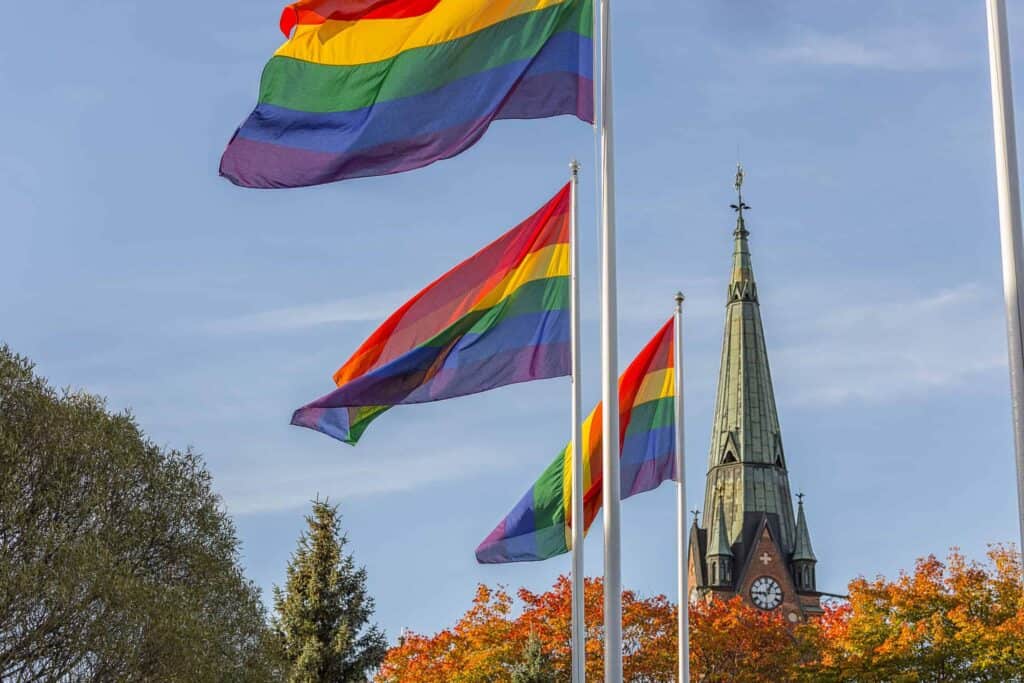This is part one of an ongoing series on problematic trends in the church regarding LGBT issues.
There’s a movement in Christian circles where those struggling with same-sex attractions identify themselves with terms like “gay Christian” or “gay celibate Christian.”
Others use terms like “sexual minority Christians,” “queer Christian” or even “trans Christian.”
Many who describe themselves this way – but by no means all – say they are embracing chastity or celibacy and pursuing a relationship with Christ. That is, they believe the historic, biblical Christian sexual ethic, that God created humans male and female, and sexual expression is reserved for the marriage relationship of a husband and wife.
A number of Christian writers and ministries have adopted this nomenclature, with some of them training churches and other ministries to follow their lead.
Focus on the Family does not believe these terms are biblical or helpful for same-sex-attracted strugglers. Although these groups and individuals hold to biblical teaching that transgender and homosexual lust and behavior are wrong, they fail to practice Scripture’s teaching on identity – who believers are in Christ.
We are not questioning the faith of individuals who use this language, but we would challenge the wisdom and rationale for calling themselves or others “gay Christians” or similar terms.
There are a number of arguments that people give for using “gay Christian,” including:
- “Gay” best describes my life experience as different from “heterosexual” folks.
- I take a “missiological” or “missional” approach, using “gay Christian” as a way of relating to non-Christian LGBT-identified people and reaching them for Christ.
- It’s polite to practice “pronoun hospitality,” using a person’s “chosen pronouns” and self-described “gender.”
- “Gay” is simply a linguistic synonym for “same-sex attracted,” and most people think of “gay” in this manner.
- Saying, “I’m a gay Christian” doesn’t define me – it’s just like using language like, “I’m American” or “I’m a surfer” or “I am a mechanic.”
While this article will not answer all these arguments, we’ll answer more in the future and discuss other areas of concern where many in the church have succumbed to harmful LGBT ideology.
For now, here are four reasons why identifying as a “gay Christian” is not biblical, wise or helpful. (N.B.: It’s cumbersome to use all the different LGBT terms throughout this article, so I’ll generally use “gay” as a catch-all for the wide range of “identities” created by LGBT activists.)
1. Dividing up the world into “gays” and “straights” is an unbiblical, false modern construct.
Humans are either male or female. This is actually a core identity – along with, for believers, the deeper, Christian identity of being a son or daughter of our Father. Both male and female are made in the image of God and both are good and valuable and necessary complements for each other.
Yet many in the world, and especially LGBT-identified people, see the world divided up into sexual identities: “gay” or “straight”; “transgender” or “cisgender”; “heterosexual” or “homosexual.” These are all modern, man-made identities based on sexual thoughts, feelings, socio-political constructs, behaviors and attractions.
The terminology lends itself to the idea that “gays” are a different type of people from “straights.” This is not how Scripture identifies people – so why should we?
2. It’s unbiblical and disconnected from Church history – not to mention nonsensical – to call oneself a “gay Christian.”
Here’s a simple thought experiment: Can you imagine any of the early believers identifying this way? “Hi, I’m James; I’m the gay apostle.”
It’s absurd.
It’s just as much of a problem if you substitute the Greek words commonly translated “homosexual” in the New Testament. First, there’s the word “arsenokotoi,” meaning “men who lie with other men” – which is what many mean by our modern term “gay.” It’s impossible to believe that any man throughout Church history would say, “I’m an arsenokotoi, but also a chaste Christian.”
It’s oxymoronic.
Malakoi is another word for homosexuality in Scripture; it means effeminate or soft. No disciple would ever say, “That’s Nicodemus; he’s the effeminate follower of Jesus.”
No. Adding “gay” to “Christian” is to detach from biblical and historic Christianity. It puts a barrier between a believer and his true identity in Christ.
3. “Gay Christians” argue that “gay” is the equivalent of “same-sex attractions.” But that’s not really how most people use this language.
While people sometimes use “gay” to mean “same-sex attracted,” the term is more often used as if “being gay” were a person’s core identity. People use language like, “I discovered my true self,” or “He’s gay” or “I came out as gay” – as if revealing their central, most authentic self.
I would argue that most people assume that when someone says, “I’m gay,” it means the person is not only same-sex attracted, but also acting on their desires and pursuing same-sex romantic or sexual relationships. The redefinition of marriage to include “gay marriage” has further cemented this into people’s minds, regardless of whether someone adds the term “celibate” or “single” as a modifier.
Using “gay Christian” language is even more confusing today because so many churches, denominations and religious colleges affirm LGBT attractions, identities and relationships. Activist groups like the Human Rights Campaign, Q Christian Fellowship, “Side A Christians,” and The Reformation Project actively promote “gay Christianity.”
The linguistic sleight of hand of those who say, “Well, when I say, ‘gay Christian’ I mean I’m attracted to the same sex,” is not convincing when “gay” is so connected to sexual lust and behavior in the minds of many. Why use language that is so confusing?
4. Calling oneself “gay” buys into the lie that we define ourselves by our own thoughts, feelings, beliefs, and romantic and sexual attractions.
In his book Strange New World, Carl Trueman describes our modern culture’s view of “the self,” which he says is characterized by people believing they create or discover their “true identity.”
“Being gay” is part of a broken world where “expressive individualism” rules.
Truman writes, “The priority that the LGBTQ+ movement places on sexual desire and inner feelings relative to personal identity is part of this broader accent on the inner, psychological life of Western people that shapes us all.”
It’s difficult to see why authentic Jesus followers would buy into this postmodern ideology and see sexual attractions (or “sexual orientation,” a spurious concept invented by psychologists) as a core part of themselves, worthy of being placed in front of being a Christian. This is not a biblical view of personhood. Certainly sex and sexuality are part of who we are, but they aren’t the defining aspect of believers’ lives.
I’ve read a lot of the arguments from “gay Christians”; far too much ink has been spilled on debating this question. But I have yet to see an argument for this terminology that is rooted in Scripture.
It’s important for the whole Church to have correct thinking on this issue. The language people use to describe themselves is an important theological consideration, not a matter of preference or self-definition.
So we do not define people by sexual attractions or sexual behaviors. Rather we see men and women, created in God’s image and deeply loved by Him.
Related Articles and Resources
10 Things Everyone Should Know About a Christian View of Homosexuality
Carl Trueman: Strange New World: How Thinkers and Activists Redefined Identity and Sparked the Sexual Revolution
Is ‘Gay Christian’ a Proper Term?
Joe Dallas: In Other Words, Part One, Two and Three
Linda Seiler: Becoming the Woman God Made Me to Be; Trans-Formation: A Former Transgender Responds to LGBTQ
Rosaria Butterfield: Accepting My True Identity in Christ, Part One and Part Two; The Secret Thoughts of an Unlikely Convert; Five Lies of Our Anti-Christian Age
Image from Shutterstock.
Is being gay a sin? Before we say anything else, please know that “being gay” doesn’t send anybody to hell. God uses only one fact to judge the world and determine who is saved and who isn’t: faith in Jesus Christ.
What the Christian message is about
We are all sinners, but we can be forgiven and born again through faith in Christ.
Here’s the bad news: We all deserve to go to hell.
When it comes to what we do and the way we’ve lived our lives, everybody stands condemned — whether they identify as gay or straight, liberal or conservative, religious or not. And everybody stands condemned, whether they are male or female, black or white, old or young.
- We read in Psalm 14:1-3, “There is none who does good, not even one” (ESV).
- And the apostle Paul — who calls himself the “worst of sinners” — says, “All have sinned and fall short of the glory of God” (Romans 3:23, ESV).
But the good news is that God loves us in spite of our sin, and He sent His Son Jesus Christ to purchase our redemption. The Bible tells us:
- “Whoever has the Son has life; whoever does not have the Son of God does not have life.” (I John 5:12, ESV).
- “For God did not send his Son into the world to condemn the world, but in order that the world might be saved through him. Whoever believes in him is not condemned, but whoever does not believe is condemned already, because he has not believed in the name of the only Son of God.” (John 3:17-18, ESV).
With those things in mind, we think your question really boils down to, “Is it possible to believe in Jesus and be homosexual at the same time?”, “Is it possible to be gay and a Christian?” And the answer, as we see it, is both yes and no.
Is Being Gay a Sin
Here at Focus on the Family, we take the view that there’s an important difference between homosexual feelings and desires and acting on those feelings and desires.
As with any sinful behavior, it’s not about being tempted, but about willfully engaging in activity that goes against God’s law.
So to answer the question: Can you be gay and a Christian? Yes– You can be a Christian and, at the same time, struggle with same-sex attraction. But no — you can’t be a faithful, obedient Christian while willingly involving yourself in homosexual acts.
Anybody who wants to follow Jesus Christ needs to make it their goal to stay away from sexual practices that the Bible says are sinful. Consider the great mystery of the Christian life: “Christ in you, the hope of glory” (Colossians 1:27, ESV). Not next to you, not over you, but in you. That’s the deeper reason why a practicing homosexual cannot be a practicing Christian.
The same would go for anyone engaged in any sexual sin — just as Paul says in his first letter to the Corinthians, “Do you not know that your bodies are members of Christ? Shall I then take the members of Christ and make them members of a prostitute? Certainly not!” (1 Corinthians 6:15, ESV)
When we accept Christ as Savior, we also make a decision to live the way He wants us to live — righteously by the power of the Holy Spirit.
Want to talk about it?
We know this is a complicated and personal subject. Would you let us come alongside you?
Call us for a free over-the-phone consultation. Our licensed or pastoral counselors would welcome the chance to hear your story and talk with you in more detail.
In the meantime, you might want to dig into the recommended resources we’ve listed here.
Resources
If a title is currently unavailable through Focus on the Family, we encourage you to use another retailer.
The Gay Gospel? How Pro-Gay Advocates Misread the Bible
Referrals
Desert Stream Ministries












